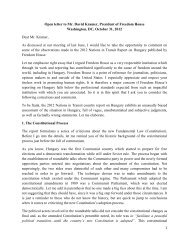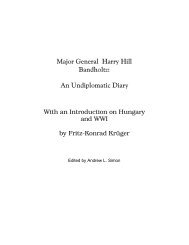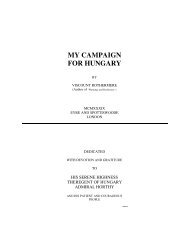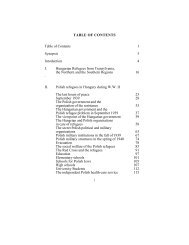The Fate of Western Hungary 1918-1921 - Corvinus Library ...
The Fate of Western Hungary 1918-1921 - Corvinus Library ...
The Fate of Western Hungary 1918-1921 - Corvinus Library ...
You also want an ePaper? Increase the reach of your titles
YUMPU automatically turns print PDFs into web optimized ePapers that Google loves.
trade concessions. This was justified by reasoning that its original claims were<br />
already reduced to a quarter, while the Austrian leadership consistently rejected<br />
every one <strong>of</strong> its counter-proposals. <strong>The</strong> Hungarian government sought<br />
assurances in its final (August 18) proposal: 1. Austria agrees that the claimed<br />
areas – at least Sopron and its surroundings – remain a part <strong>of</strong> <strong>Hungary</strong> until the<br />
conclusion <strong>of</strong> the dialogue. 2. This fact to be conveyed to the Council <strong>of</strong><br />
Ambassadors in Paris. 3. That public administration <strong>of</strong>ficials in the ceded area<br />
remain in their jobs. 264<br />
<strong>The</strong> Hungarian government also stated that, in the matter <strong>of</strong> the affiliation <strong>of</strong><br />
contested areas, as a final solution, it will agree to a decision by plebiscite, with<br />
the proviso that the affected areas do not first come under Austrian<br />
administration. If the Austrian government is not willing to accept this, then<br />
<strong>Hungary</strong> requested agreement primarily to the following issues: exchange <strong>of</strong><br />
currency, assurance on tax arrears, settlement <strong>of</strong> the government’s debts and<br />
war bonds resulting from the war, as well as various guarantees for the<br />
Hungarian state assets in <strong>Western</strong> <strong>Hungary</strong>. <strong>The</strong> Bethlen government estimated<br />
that the common Austrian-Hungarian assets on the to-be-annexed territory ran<br />
to 3.971 billion Kroner. Of that, <strong>Hungary</strong> tried to tie the recovery <strong>of</strong> its<br />
proportion to the handover <strong>of</strong> <strong>Western</strong> <strong>Hungary</strong>, as well as the withdrawal <strong>of</strong><br />
South Slav troops from southern <strong>Hungary</strong>. In fact, it stated that, if it was unable<br />
to come to an agreement with the Vienna government, Budapest would only<br />
cede <strong>Western</strong> <strong>Hungary</strong> if it was forced to do so by an ultimatum from the<br />
Entente.<br />
From the above negotiations, it can clearly be seen that the earlier Teleki<br />
government, and from the middle <strong>of</strong> April, <strong>1921</strong>, the Bethlen government,<br />
strongly defended <strong>Western</strong> <strong>Hungary</strong>, and indeed generally Hungarian, interests<br />
to the last possible moment. We will later show numerous examples <strong>of</strong> it. <strong>The</strong><br />
very fixed stance <strong>of</strong> the Bethlen government finally forced the Austrian Foreign<br />
Affairs committee to make concessions to <strong>Hungary</strong>’s demands at their August<br />
27 session. <strong>The</strong> committee authorized the Vienna government, with the<br />
agreement <strong>of</strong> the signatories <strong>of</strong> the Saint-Germain treaty, to solve the border<br />
dispute one year after the handover <strong>of</strong> <strong>Western</strong> <strong>Hungary</strong> by the expressed wish<br />
<strong>of</strong> the people. Although they did not use the term ‘plebiscite,’ the Austrian<br />
decision was clearly a political victory for the Hungarian government.<br />
<strong>The</strong> giving up <strong>of</strong> the millennial western border region caused great mental<br />
anguish in the population remaining in a <strong>Hungary</strong> dismembered after the<br />
Trianon Peace Decree. Popular opinion was most upset by the fact that its ally<br />
and co-loser in the war, Austria, also grew in territory torn from <strong>Hungary</strong>. <strong>The</strong><br />
events greatly influenced the population <strong>of</strong> Sopron, mainly German-speaking<br />
but <strong>of</strong> Hungarian-sentiment, who were especially dispirited and embittered on<br />
August 20, <strong>1921</strong> [<strong>Hungary</strong>’s national day-ed.]. This was the day that posters<br />
appeared all around the city whereby the Entente Mission announced the<br />
handover plan <strong>of</strong> <strong>Western</strong> <strong>Hungary</strong>. <strong>The</strong> time and date <strong>of</strong> the <strong>of</strong>ficial handover<br />
264 Soós, 1971, op. cit., pp. 132–133.<br />
109
















